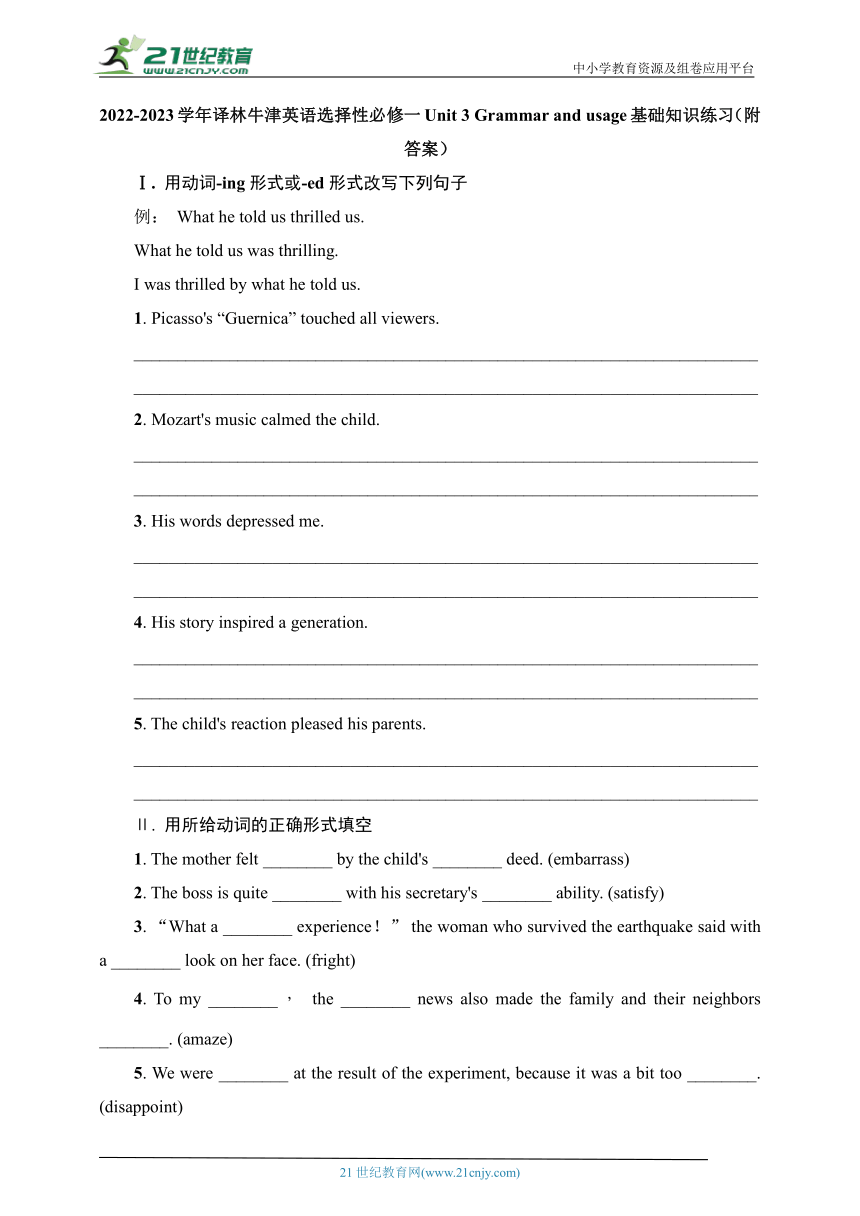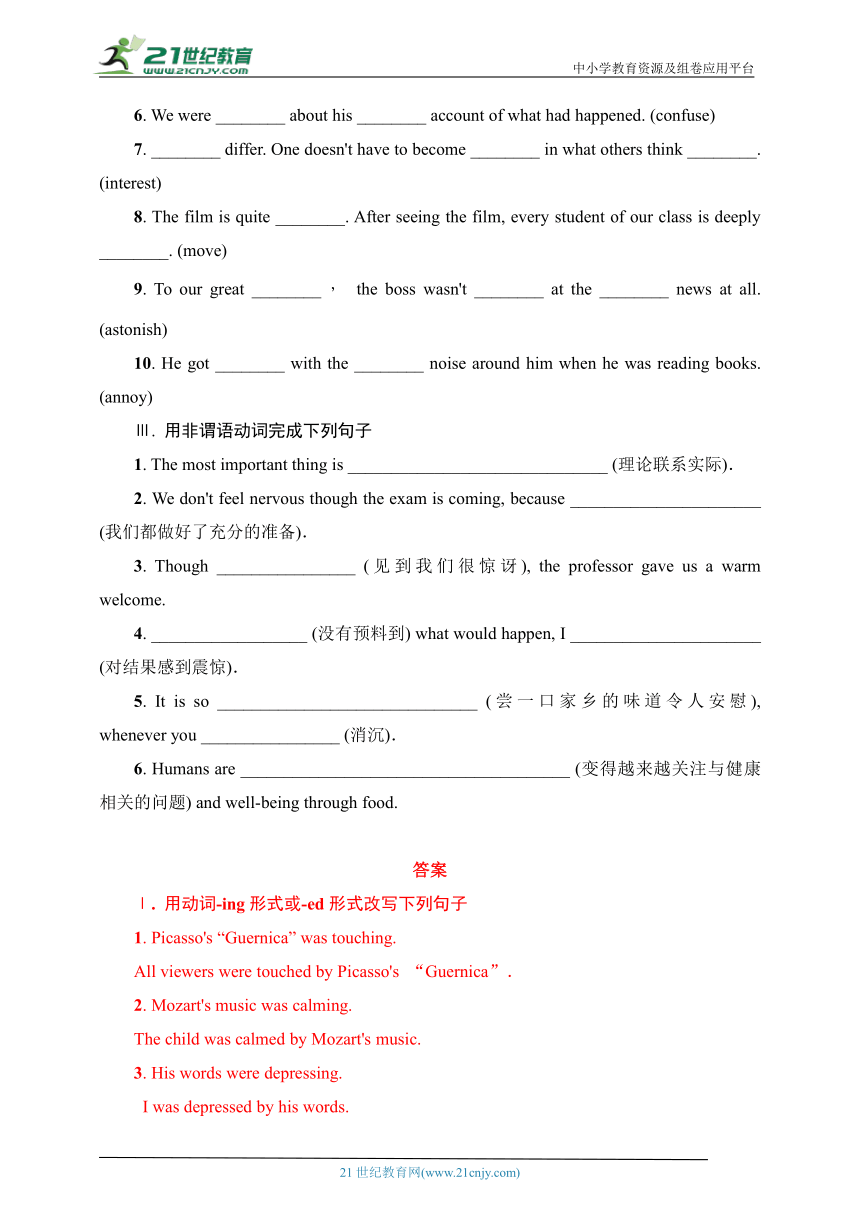Unit 3 Grammar and usage基础知识练习(附答案)新牛津译林选择性必修一
文档属性
| 名称 | Unit 3 Grammar and usage基础知识练习(附答案)新牛津译林选择性必修一 |

|
|
| 格式 | doc | ||
| 文件大小 | 862.7KB | ||
| 资源类型 | 试卷 | ||
| 版本资源 | 牛津译林版(2019) | ||
| 科目 | 英语 | ||
| 更新时间 | 2023-06-19 14:40:47 | ||
图片预览


文档简介
中小学教育资源及组卷应用平台
2022-2023学年译林牛津英语选择性必修一Unit 3 Grammar and usage基础知识练习(附答案)
Ⅰ. 用动词 ing形式或 ed形式改写下列句子
例: What he told us thrilled us.
What he told us was thrilling.
I was thrilled by what he told us.
1. Picasso's “Guernica” touched all viewers.
________________________________________________________________________
________________________________________________________________________
2. Mozart's music calmed the child.
________________________________________________________________________
________________________________________________________________________
3. His words depressed me.
________________________________________________________________________
________________________________________________________________________
4. His story inspired a generation.
________________________________________________________________________
________________________________________________________________________
5. The child's reaction pleased his parents.
________________________________________________________________________
________________________________________________________________________
Ⅱ. 用所给动词的正确形式填空
1. The mother felt ________ by the child's ________ deed. (embarrass)
2. The boss is quite ________ with his secretary's ________ ability. (satisfy)
3. “What a ________ experience!” the woman who survived the earthquake said with a ________ look on her face. (fright)
4. To my ________, the ________ news also made the family and their neighbors ________. (amaze)
5. We were ________ at the result of the experiment, because it was a bit too ________. (disappoint)
6. We were ________ about his ________ account of what had happened. (confuse)
7. ________ differ. One doesn't have to become ________ in what others think ________. (interest)
8. The film is quite ________. After seeing the film, every student of our class is deeply ________. (move)
9. To our great ________, the boss wasn't ________ at the ________ news at all. (astonish)
10. He got ________ with the ________ noise around him when he was reading books. (annoy)
Ⅲ. 用非谓语动词完成下列句子
1. The most important thing is ______________________________ (理论联系实际).
2. We don't feel nervous though the exam is coming, because ______________________ (我们都做好了充分的准备).
3. Though ________________ (见到我们很惊讶), the professor gave us a warm welcome.
4. __________________ (没有预料到) what would happen, I ______________________ (对结果感到震惊).
5. It is so ______________________________ (尝一口家乡的味道令人安慰), whenever you ________________ (消沉).
6. Humans are ______________________________________ (变得越来越关注与健康相关的问题) and well being through food.
答案
Ⅰ. 用动词 ing形式或 ed形式改写下列句子
1. Picasso's “Guernica” was touching.
All viewers were touched by Picasso's “Guernica”.
2. Mozart's music was calming.
The child was calmed by Mozart's music.
3. His words were depressing.
I was depressed by his words.
4. His story was inspiring.
A generation were/was inspired by his story.
5. The child's reaction was pleasing.
The child's parents were pleased with/by his reaction.
Ⅱ. 用所给动词的正确形式填空
1. embarrassed; embarrassing 2. satisfied; satisfying/satisfactory 3. frightening; frightened
4. amazement; amazing; amazed 5. disappointed; disappointing 6. confused; confusing 7. Interests; interested; interesting 8. moving; moved
9. astonishment; astonished; astonishing
10. annoyed; annoying
Ⅲ. 用非谓语动词完成下列句子
1. associating theories with practice 2. we are all fully prepared 3. surprised to see us 4. Not having expected; was shocked at the result 5. comforting to have a taste of home; are depressed 6. becoming increasingly concerned about the problems concerning health
21世纪教育网 www.21cnjy.com 精品试卷·第 2 页 (共 2 页)
21世纪教育网(www.21cnjy.com)
2022-2023学年译林牛津英语选择性必修一Unit 3 Grammar and usage基础知识练习(附答案)
Ⅰ. 用动词 ing形式或 ed形式改写下列句子
例: What he told us thrilled us.
What he told us was thrilling.
I was thrilled by what he told us.
1. Picasso's “Guernica” touched all viewers.
________________________________________________________________________
________________________________________________________________________
2. Mozart's music calmed the child.
________________________________________________________________________
________________________________________________________________________
3. His words depressed me.
________________________________________________________________________
________________________________________________________________________
4. His story inspired a generation.
________________________________________________________________________
________________________________________________________________________
5. The child's reaction pleased his parents.
________________________________________________________________________
________________________________________________________________________
Ⅱ. 用所给动词的正确形式填空
1. The mother felt ________ by the child's ________ deed. (embarrass)
2. The boss is quite ________ with his secretary's ________ ability. (satisfy)
3. “What a ________ experience!” the woman who survived the earthquake said with a ________ look on her face. (fright)
4. To my ________, the ________ news also made the family and their neighbors ________. (amaze)
5. We were ________ at the result of the experiment, because it was a bit too ________. (disappoint)
6. We were ________ about his ________ account of what had happened. (confuse)
7. ________ differ. One doesn't have to become ________ in what others think ________. (interest)
8. The film is quite ________. After seeing the film, every student of our class is deeply ________. (move)
9. To our great ________, the boss wasn't ________ at the ________ news at all. (astonish)
10. He got ________ with the ________ noise around him when he was reading books. (annoy)
Ⅲ. 用非谓语动词完成下列句子
1. The most important thing is ______________________________ (理论联系实际).
2. We don't feel nervous though the exam is coming, because ______________________ (我们都做好了充分的准备).
3. Though ________________ (见到我们很惊讶), the professor gave us a warm welcome.
4. __________________ (没有预料到) what would happen, I ______________________ (对结果感到震惊).
5. It is so ______________________________ (尝一口家乡的味道令人安慰), whenever you ________________ (消沉).
6. Humans are ______________________________________ (变得越来越关注与健康相关的问题) and well being through food.
答案
Ⅰ. 用动词 ing形式或 ed形式改写下列句子
1. Picasso's “Guernica” was touching.
All viewers were touched by Picasso's “Guernica”.
2. Mozart's music was calming.
The child was calmed by Mozart's music.
3. His words were depressing.
I was depressed by his words.
4. His story was inspiring.
A generation were/was inspired by his story.
5. The child's reaction was pleasing.
The child's parents were pleased with/by his reaction.
Ⅱ. 用所给动词的正确形式填空
1. embarrassed; embarrassing 2. satisfied; satisfying/satisfactory 3. frightening; frightened
4. amazement; amazing; amazed 5. disappointed; disappointing 6. confused; confusing 7. Interests; interested; interesting 8. moving; moved
9. astonishment; astonished; astonishing
10. annoyed; annoying
Ⅲ. 用非谓语动词完成下列句子
1. associating theories with practice 2. we are all fully prepared 3. surprised to see us 4. Not having expected; was shocked at the result 5. comforting to have a taste of home; are depressed 6. becoming increasingly concerned about the problems concerning health
21世纪教育网 www.21cnjy.com 精品试卷·第 2 页 (共 2 页)
21世纪教育网(www.21cnjy.com)
同课章节目录
- Unit 1 Food matters
- Welcome to the unit
- Reading
- Grammar and usage
- Integrated skills
- Extended reading
- Project
- Unit 2 The Universal Language
- Welcome to the unit
- Reading
- Grammar and usage
- Integrated skills
- Extended reading
- Project
- Unit 3 The art of painting
- Welcome to the unit
- Reading
- Grammar and usage
- Integrated skills
- Extended reading
- Project
- Unit 4 Exploring poetry
- Welcome to the unit
- Reading
- Grammar and usage
- Integrated skills
- Extended reading
- Project
